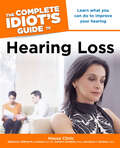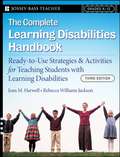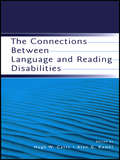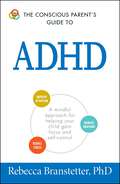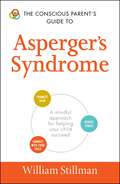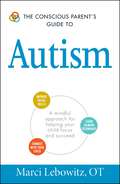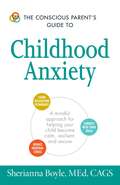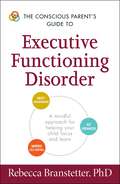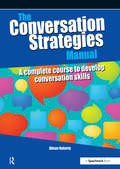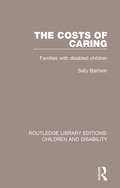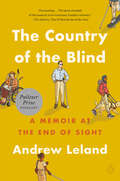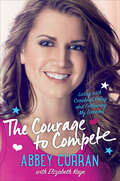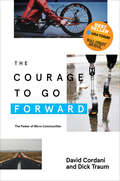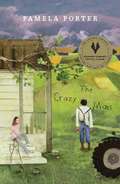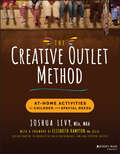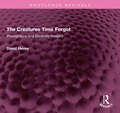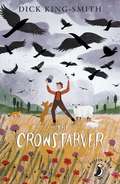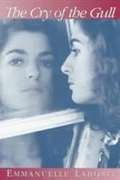- Table View
- List View
The Complete Idiot's Guide to Hearing Loss: Learn What You Can Do to Improve Your Hearing
by House Clinic William M. LuxfordApplying straightforward sense to one of our most important sense. Hearing loss and impairment is a problem that millions of adults and children suffer from. With a wide array of symptoms, it is important to have one authoritative resource for information. Written by certified otolaryngologists under the auspices of the world renowned House Ear Clinic, The Complete Idiot's Guide® to Hearing Loss covers all conditions and symptoms, along with methods of prevention and treatment, including: • The most familiar symptoms of hearing impairment and loss • Details about such conditions as inner ear infections, tinnitus, cochlear problems, otosclerosis, and dizziness • Complete treatment information, including details about hearing aids, surgery, and protective devices
The Complete Learning Disabilities Handbook
by Joan Harwell Rebecca Williams JacksonThe third edition of this classic resource is a comprehensive source of information, strategies, and activities for working with learning disabled students. The book offers special educators, classroom teachers, and parents a wealth of new and proven suggestions and ready-to-use materials for helping LD students of all ages learn and perform at their fullest potential.
The Comprehending Hand
by Lilli NielsenIn this monograph, originally published in 1976, Nielsen sets down the basic premises of her active learning approach toward blind infants. She notes the typical developmental stages of sighted infants and suggests ways to help blind infants achieve the same milestones. Nielsen emphasizes the importance of offering the blind child an environment which is interesting and challenging through touch and sound.
The Comprehensive Guide to Special Education Law: Over 400 Frequently Asked Questions and Answers Every Educator Needs to Know about the Legal Rights of Exceptional Children and their Parents
by George A. GiulianiIt is vital for all professionals in the field of education to have a practical understanding of the laws that are in place to protect the children with whom they work. The Comprehensive Guide to Special Education Law is a detailed yet accessible introduction to federal law as it applies to the rights of children with special needs. Written in a user-friendly question and answer format, the book covers all of the key areas of special education law including parental rights of participation, the legal right to Free Appropriate Public Education (FAPE) and related services, and the complex issues of discipline and dispute resolutions. This book provides educators with knowledge of the requirements, history, and evolution of the laws that impact their daily working lives and gives them the information they need to help parents obtain better services for their children. This is an indispensible handbook that teachers, school management, and school counselors will refer to again and again.
The Connections Between Language and Reading Disabilities
by Alan G. Kamhi Hugh W. CattsThis is an edited book based on papers presented at a 2003 invitee-only conference under the sponsorship of the Merrill Advanced Studies Center of the University of Kansas. The participants were prominent scholars in the areas of language and reading, and have research programs funded by NIH and other sources. The purpose of the gathering was to discuss theoretical issues and research findings concerning the relationship between developmental language and reading disabilities, specifically looking at neurological, behavioral, and genetic factors. In addition, it discussed other factors contributing to reading difficulties in the middle elementary school years through adolescence and literacy outcomes for children with early language impairments, and how these problems relate to children with dyslexia. The Foreword is written by Reid Lyon, Branch Chief, Child Development and Behavior Branch, NICHD-National Institutes of Health.This book appeals to scholars in the areas of language disorders and reading disabilities, as well as to practicing speech-language pathologists, special educators, and reading specialists. It may also be used in graduate courses designed as seminars in either language disorders or reading disabilities in schools of communication disorders, as well as schools of education--especially special education departments.
The Conquest of Blindness: An Autobiographical Review of the Life and Work of Henry Randolph Latimer
by Henry Randolph Latimer<P>The term "Conquest of Blindness" is taken to include any preventive, remedial, educational, rehabilitating, or relief phase of work pertaining to the handicap of blindness. <P>The primary aim of the volume is to lift work for the conquest of blindness out of the miasma of alms and asylums into the more wholesome atmosphere of social adjustment. <P>Other aims of the volume are to serve as a supplementary text for the use of the profession, and as an incentive to the chance reader to delve more deeply into the subject, and to present as modestly as may be the autobiography of one blind person who has contributed in small measure toward the conquest of blindness.
The Conscious Parent's Guide To ADHD
by Rebecca BranstetterAn integrative method for helping children focus and learn!If your child has been given a diagnosis of ADHD, you may be feeling overwhelmed and unsure of what to do next. With The Conscious Parent's Guide to ADHD, you will learn how to take a relationship-centered approach to parenting that engages your child and ensures that he succeeds behaviorally, socially, and cognitively. Conscious parenting is about being present with your child and taking the time to understand how to help him flourish. By practicing this mindful method, you can support your child emotionally and help nurture his development.With this all-in-one guide, you can create a plan that not only addresses the challenges a child with ADHD faces, but also creates a mindful, less stressful atmosphere for the whole family.You'll be able to:Honor your child's unique learning styleAdapt a conscious parenting philosophy that works for everyoneUnderstand treatment options and weigh the pros and cons of medicationLower stress levels for the entire family, including other siblingsLearn how a mindful approach can be combined with other treatmentsHelp your child focus at home and schoolFocus on your child's strengths as well as weaknessesEncourage your child to achieve his goalsWhen both you and your child are more mindful and relaxed, your child can learn to focus, gain independence, and thrive both in school and out.
The Conscious Parent's Guide To ADHD: A Mindful Approach for Helping Your Child Gain Focus and Self-Control
by Rebecca BranstetterAn integrative method for helping children focus and learn!If your child has been given a diagnosis of ADHD, you may be feeling overwhelmed and unsure of what to do next. With The Conscious Parent's Guide to ADHD, you will learn how to take a relationship-centered approach to parenting that engages your child and ensures that he succeeds behaviorally, socially, and cognitively. Conscious parenting is about being present with your child and taking the time to understand how to help him flourish. By practicing this mindful method, you can support your child emotionally and help nurture his development.With this all-in-one guide, you can create a plan that not only addresses the challenges a child with ADHD faces, but also creates a mindful, less stressful atmosphere for the whole family.You'll be able to:Honor your child's unique learning styleAdapt a conscious parenting philosophy that works for everyoneUnderstand treatment options and weigh the pros and cons of medicationLower stress levels for the entire family, including other siblingsLearn how a mindful approach can be combined with other treatmentsHelp your child focus at home and schoolFocus on your child's strengths as well as weaknessesEncourage your child to achieve his goalsWhen both you and your child are more mindful and relaxed, your child can learn to focus, gain independence, and thrive both in school and out.
The Conscious Parent's Guide To Asperger's Syndrome
by William StillmanA positive, mindful plan for the whole family!If your child has been given a diagnosis of Asperger's syndrome, you may be feeling overwhelmed and unsure of what to do next. With The Conscious Parent's Guide to Asperger's Syndrome, you will learn how to take a relationship-centered approach to parenting that engages your child and ensures that he succeeds behaviorally, socially, and cognitively. Conscious parenting is about being present with your child and taking the time to understand how to help him flourish. By practicing this mindful method, you can support your child emotionally and help nurture his development.This easy-to-use guide helps you to:Honor your child's unique perspective and cognitive strengthsAdapt a conscious parenting philosophy that works for everyoneIdentify triggers that can lead to sensory overloadLower stress levels for the entire family, including other siblingsKeep open communication with your child and help him foster good relationshipsEmbrace your child's passions and help him grow in practical waysEducate your family and friends about Asperger'sAdvocate for your child at schoolWith The Conscious Parent's Guide to Asperger's Syndrome, you'll learn to create a calm and mindful atmosphere for the whole family, while helping your child succeed and thrive.
The Conscious Parent's Guide To Asperger's Syndrome: A Mindful Approach for Helping Your Child Succeed
by William StillmanA positive, mindful plan for the whole family!If your child has been given a diagnosis of Asperger's syndrome, you may be feeling overwhelmed and unsure of what to do next. With The Conscious Parent's Guide to Asperger's Syndrome, you will learn how to take a relationship-centered approach to parenting that engages your child and ensures that he succeeds behaviorally, socially, and cognitively. Conscious parenting is about being present with your child and taking the time to understand how to help him flourish. By practicing this mindful method, you can support your child emotionally and help nurture his development.This easy-to-use guide helps you to:Honor your child's unique perspective and cognitive strengthsAdapt a conscious parenting philosophy that works for everyoneIdentify triggers that can lead to sensory overloadLower stress levels for the entire family, including other siblingsKeep open communication with your child and help him foster good relationshipsEmbrace your child's passions and help him grow in practical waysEducate your family and friends about Asperger'sAdvocate for your child at schoolWith The Conscious Parent's Guide to Asperger's Syndrome, you'll learn to create a calm and mindful atmosphere for the whole family, while helping your child succeed and thrive.
The Conscious Parent's Guide to Autism
by Marci LebowitzHelp your child feel confident and capable!If your child has a diagnosis of "on the autism spectrum," you may be feeling overwhelmed and most likely intimated. Often the focus is on "disabilities" rather than "abilities," and you may be left wondering what you should expect as your child journeys through life. With The Conscious Parent's Guide to Autism, you will learn how to take a relationship-centered approach to engage your child. Conscious parenting means being present with your children and taking the time to understand their point of view. Using this mindful method, you can help your child improve language skills, motor skills, and social skills.You'll also learn how to:Honor your child's unique perspective and cognitive strengthsAdapt a conscious parenting philosophy that works for everyoneIdentify triggers that can lead to sensory overloadHelp your child feel in control with calming routinesLower stress levels for the entire family, including other siblingsEducate your family and friends about autismAdvocate for your childFind ways to improve communicationWith The Conscious Parent's Guide to Autism, you'll learn to create a calm and mindful atmosphere for the whole family, while helping your child succeed and thrive.
The Conscious Parent's Guide to Autism: A Mindful Approach for Helping Your Child Focus and Succeed
by Marci LebowitzHelp your child feel confident and capable!If your child has a diagnosis of "on the autism spectrum," you may be feeling overwhelmed and most likely intimated. Often the focus is on "disabilities" rather than "abilities," and you may be left wondering what you should expect as your child journeys through life. With The Conscious Parent's Guide to Autism, you will learn how to take a relationship-centered approach to engage your child. Conscious parenting means being present with your children and taking the time to understand their point of view. Using this mindful method, you can help your child improve language skills, motor skills, and social skills.You'll also learn how to:Honor your child's unique perspective and cognitive strengthsAdapt a conscious parenting philosophy that works for everyoneIdentify triggers that can lead to sensory overloadHelp your child feel in control with calming routinesLower stress levels for the entire family, including other siblingsEducate your family and friends about autismAdvocate for your childFind ways to improve communicationWith The Conscious Parent's Guide to Autism, you'll learn to create a calm and mindful atmosphere for the whole family, while helping your child succeed and thrive.
The Conscious Parent's Guide to Childhood Anxiety: A Mindful Approach for Helping Your Child Become Calm, Resilient, and Secure (Conscious Parenting Relationship Series)
by Sherianna BoyleHelp your child feel confident and capable!If your child has been given a diagnosis of anxiety, you may be feeling overwhelmed and unsure of what to do next. With The Conscious Parent's Guide to Childhood Anxiety, you will learn how to take a relationship-centered approach to parenting that engages your child and ensures that he succeeds behaviorally, socially, and cognitively. Conscious parenting is about being present with your child and taking the time to understand how to help him flourish. By practicing this mindful method, you can support your child emotionally and help nurture his development.This easy-to-use guide helps you to:Communicate openly with your child about anxietyBuild a supportive home environmentDetermine your child's anxiety triggersLearn strategies that will help your child release anxiety and feel calmTeach your child long-term coping skillsDiscipline your child without increasing his anxietyEducate and work with teachers and school officialsWith The Conscious Parent's Guide to Childhood Anxiety, you will learn to create a calm and mindful atmosphere for the whole family, while helping your child feel competent, successful, and healthy.
The Conscious Parent's Guide to Executive Functioning Disorder: A Mindful Approach for Helping Your child Focus and Learn
by Rebecca BranstetterHelp your child feel confident and capable!If your child has been given a diagnosis of executive functioning disorder, you may be feeling overwhelmed and unsure of what to do next. You want your child to be able to master certain basic skills, such as being organized, staying focused, and controlling impulses and emotions. But what if your child is having trouble with one or all of these skills? With The Conscious Parent's Guide to Executive Functioning Disorder, you'll learn how to take a relationship-centered approach to parenting as you help improve your child's executive functioning skills:Task initiationResponse inhibitionFocusTime managementWorking memoryFlexibilitySelf-regulationCompleting tasksOrganizationConscious parenting is about being present with your children and taking the time to understand how to help them flourish. With the strategies and advice in this guide, you and your child will build sustainable bonds, develop positive behaviors, and improve executive functioning skills for life. And you'll find that conscious parenting helps create a calm and mindful atmosphere for the whole family, while helping your child feel competent, successful, and healthy.
The Conversation Strategies Manual: A Complete Course to Develop Conversation Skills
by Alison RobertsSome people worry about participating in social settings because they lack confidence in their conversation skills. They may dread an evening at the pub or even just a chat with one friend, for fear of saying the wrong thing, not being able to think of anything to talk about, or whether they will find themselves feeling generally embarrassed about their conversational technique. This book offers a structure to help with the skills needed for initiating, maintaining, and ending conversations. It looks at casual chat and formal talk with one person face-to-face and on the phone, as well as how to converse in a group. There are over 30 chapters, each dealing with an aspect of conversation such as Greetings How to remember names Being topical, Using humour Reminiscing Repairing conversational gaffs, Escaping! The Conversational Menu Each topic is considered and discussed; exercises are suggested; "homework" is given on credit-card-sized cards, and then the Checklist is filled in, so that learning is secure. This is a complete course on conversation skills. designed for people over 16, either to work with the Speech and Language Therapist, or for some, to work on their own. Alison Roberts is a Speech and Language Therapist whose work has chiefly focused for the last 20 years on the communication needs of 11-25 year-olds with a wide variety of intriguing differences in ability. She works with several brilliant therapists who together form a team called Good Communication. Alison lectures to SLT students and to Careers Advisers and has written several sets of cards and books which have been published by Speechmark Publishing. She is also an enthusiastic craftswoman with an endless need and desire to devise her own SLT games, which gave rise to the original series of articles in the Speech and Language Therapy in Practice magazine.
The Costs of Caring: Families with Disabled Children (Routledge Library Editions: Children and Disability #4)
by Sally BaldwinFirst published in 1985, this book considers the financial consequences of parents and other relatives caring for severely disabled children at home. At the time of publication little reliable information was available on the costs incurred by ‘informal carers’, which this book set to rectify. The volume interweaves hard statistical material about money with the detailed personal responses of parents. It examines the claim that disablement in a child reduces parents’ earnings while simultaneously creating an extra expense. The author compares the incomes and expenditure patterns of more than 500 families with disabled children and 700 control families of the time showing that the financial effects of disablement in a child can be far-reaching and pervasive. This book discusses contemporary policy implications of these findings in a chapter dealing with the rational for compensating families with disabled children, and in the final chapter. Although the book was original published in 1985, it references issues that are still important today and, whilst its main concern is families with disabled children, it will also be useful to anyone caring for other kinds of dependent people, such as the elderly.
The Counseling Approach to Careers Guidance
by Lynda Ali Barbara Graham Susan LendrumFrom The Book Jacket The Counselling Approach to Careers Guidance offers a structured model which can be adapted to meet the specific needs of each client. Through detailed case material Lynda All and Barbara Graham show how to use counselling strategies with clients to enable them to change unhelpful patterns of thought and to move towards achievable goals. The book also explores materials available to careers counsellors and discusses important issues affecting their training and development within the public sector. This will be a useful handbook for experienced advisers and trainees in the careers service and a range of professional settings. Lynda All is Senior Careers Adviser, Edinburgh University. Barbara Graham is Director of the Careers Service, University of Strathclyde. Susan Lendrum is author of Gift of Tears and Case Material and Role Play in Counselling Training and a counsellor in private practice, Manchester. CAREERS GUIDANCE/COUNSELLING
The Country of the Blind: A Memoir at the End of Sight
by Andrew LelandFINALIST FOR THE PULITZER PRIZE Named one of the best books of the year by: THE NEW YORKER • THE WASHINGTON POST • THE ATLANTIC • NPR • PUBLISHERS WEEKLY • LITHUB"Fascinating...The great strength of this memoir is its voracious, humble curiosity." - The Atlantic, The 10 Best Books of the YearA witty, winning, and revelatory personal narrative of the author&’s transition from sightedness to blindness and his quest to learn about blindness as a rich culture all its own.We meet Andrew Leland as he&’s suspended in the liminal state of the soon-to-be blind: he&’s midway through his life with retinitis pigmentosa, a condition that ushers those who live with it from sightedness to blindness over years, even decades. He grew up with full vision, but starting in his teenage years, his sight began to degrade from the outside in. Soon— but without knowing exactly when—he will likely have no vision left.Full of apprehension but also dogged curiosity, Leland embarks on a sweeping exploration of the state of being that awaits him: not only the physical experience of blindness but also its language, politics, and customs. He negotiates his changing relationships with his wife and son, and with his own sense of self, as he moves from his mainstream, &“typical&” life to one with a disability. Part memoir, part historical and cultural investigation, The Country of the Blind represents Leland&’s determination not to merely survive this transition but to grow from it—to seek out and revel in that which makes blindness enlightening. Brimming with warmth and humor, it is an exhilarating tour of a new way of being.
The Courage to Compete: Living with Cerebral Palsy and Following My Dreams
by Elizabeth Kaye Abbey CurranA remarkable memoir by Miss Iowa USA Abbey Curran about living with cerebral palsy, competing in Miss USA, and her inspiring work with young women who have disabilities.Abbey Curran was born with cerebral palsy, but early on she resolved to never let it limit her. Abbey made history when she became the first contestant with a disability to win a major beauty pageant. After earning the title of Miss Iowa, she went on to compete in Miss USA.Growing up on a hog farm in Illinois, Abbey competed in local pageants despite naysayers who told her not to. After realizing her own dream, she went on to help other disabled girls achieve their goals by starting Miss You Can Do It, a national nonprofit pageant for girls and women with special needs and challenges, which became the subject of an HBO documentary with the same name. This is Abbey’s story.
The Courage to Go Forward: The Power of Micro Communities
by David Cordani Dick TraumThe Courage to Go Forward shows that individuals need to think differently about creating supportive communities to help each other set and achieve goals, both individually and collectively. Those interested in making a positive impact on society need to consider how to complement societal programs designed for the “average” person with customized approaches tailored to the unique needs and aspirations of every individual. Focused on the inspirational relationship between Cigna, a global health service company, and Achilles International, a nonprofit focused on encouraging disabled people to participate in mainstream athletics, The Courage to Go Forward demonstrates the power and triumph of the human spirit and provides valuable insight into the formation and importance of micro communities. David Cordani, president and CEO of Cigna, and Achilles International founder and president Dick Traum come from very different backgrounds yet share a similar set of passions that eventually brought them together, forming a relationship that has positively impacted communities ranging from inspired employees to thousands of disabled athletes competing at the highest levels. Filled with wisdom from two impactful leaders, a collection of inspiring profiles of Achilles athletes, and stunning imagery, The Courage to Go Forward offers a combination of powerful inspiration and important business lessons, including the potential power of partnership between for-profit and nonprofit organizations, and should be required reading for anyone who wants to drive positive societal change, and to encourage others—or themselves—to achieve beyond their perceived limitations.
The Crazy Man
by Pamela PorterA poem about Emaline, a small girl who has to cope with a permanent disability and a broken family, since her father suffers from a mental illness.
The Creative Outlet Method: At-Home Activities for Children with Special Needs
by Joshua LevyA practical guide for parents and special educators to help enrich the lives of children with special needs In The Creative Outlet Method Book of Creativity: At-Home Activities for Children with Special Needs, certified special education educator Joshua Levy delivers practical and effective resources for conducting over 30 enriching theater arts and improvisational activities. The included exercises will allow children with disabilities to demonstrate creativity, increase self-confidence, and build social skills. Special needs children will benefit from the innovative approaches included in The Creative Outlet Method and experience creative energy from the comfort of home. The book also offers: Opportunities for children with special needs to achieve their academic, social, and behavioral goals Activities that enrich the lives of special needs students, their parents, and other caregivers A 10-step framework to improving the learning outcomes for children with special needs The Creative Outlet Method Book of Creativity is an indispensable resource for the parents and caregivers of special needs children, special education teachers, administrators, and therapists. It's also a must-read for K-12 general educators looking for ways to better engage with their special needs students.
The Creatures Time Forgot: Photography and Disability Imagery (Routledge Revivals)
by David HeveyFirst published in 1992, The Creatures Time Forgot examines the representation of disabled people – in advertising, particularly that produced by disability charities, and in the work of photographers such as Diane Arbus and Gary Winogrand. He shows how such images construct disabled people as ‘creatures,’ the tragic-but-brave objects of photographic gaze, or as the ‘’appy ‘andicapped’ of ‘positive imagery’ advertising. As a disabled photographer and writer, David Hevey has been a pioneer in challenging such visual representations of disabled people. His work advocates a move away from medical, charity or impairment-fixated imagery towards a visual equivalent of ‘Rights not Charity’. The book outlines David Hevey’s own photographic practice and includes wide-ranging selections from his work to create a visual form which reflects the new social presence of disabled people. This book will be of interest to students of media studies, cultural studies, and disability studies.
The Crowstarver (A Puffin Book)
by Dick King-SmithA beautiful story for older readers written almost twenty years ago in which bestselling author Dick King-Smith creates a fascinating picture of rural life at the time of the Second World War. Discovered as a foundling in a lambing pen, Spider Sparrow grows up surrounded by animals. From sheep and horses to wild otters and foxes, Spider loves them all, even the crows he must scare away from the newly sown wheat. Crowstarving was the idea job for Spider - he was on his own, yet never alone for all around him were animals of one sort or another. Amazingly, every animal who meets Spider implicitly trusts the young boy. This magical rapport is Spider's unique gift, but nothing else in his tough life is so easy.
The Cry of the Gull
by Emmanuelle Laborit Constantina Mitchell Paul Raymond CoteA memoir by a deaf, French actress who starred in the French production of Children of a Lesser God.
